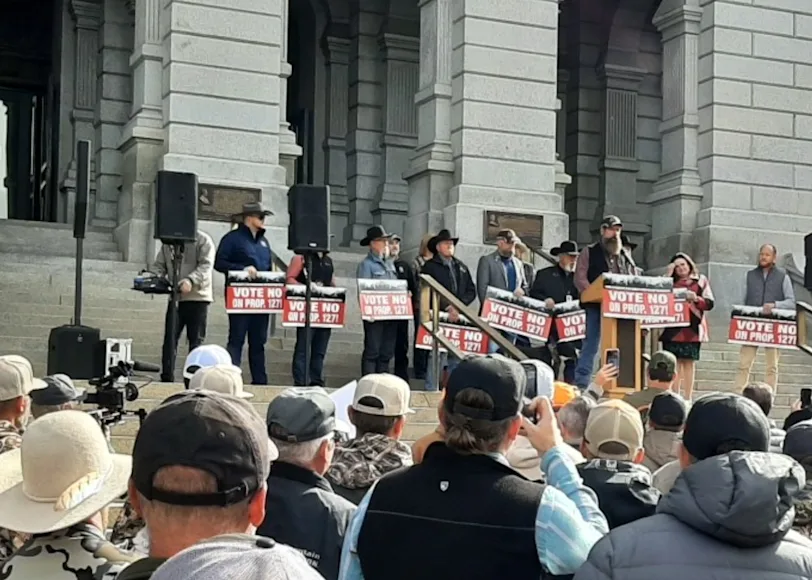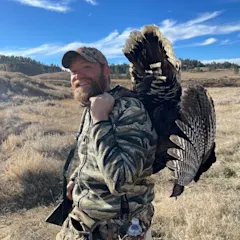This coming Tuesday, November 5, voters in Colorado will decide whether the state should ban hunting and trapping for both mountain lions and bobcats. Should it pass, Proposition 127 will have major implications for wildlife management and the future of deer and elk hunting in the Centenial State. We spoke with a Colorado Parks & Wildlife (CPW) biologist and a representative of the Rocky Mountain Elk Foundation (RMEF) to learn more about the negative impacts that Prop 127 could have on hunters, big game species, and predator populations in Colorado.
CPW Employees Oppose “Ballot Box Biology”
Casey Westbrook has worked for CPW for 25 years. A district wildlife manager based in the state’s Eastern Plains, he also serves as president of a CPW employee group called the Colorado Wildlife Employees Protective Association (CWEPA).
CWEPA made headlines on October 9, after it issued a resolution that supported “science-based wildlife management” performed by the “professionals employed by the state of Colorado for such purposes.” The proposition made a bold statement that stands in stark contrast to wildlife-related ballot measures like Prop 127—as well the 2020 referendum that forced the reintroduction of wolves into the state.
“There’s a statute that prohibits employees from expressing their opinion using any state resources, which includes when we’re working on state time, using state computers, etc., ” Westbrook told Field & Stream in a recent phone interview. “It really reduces our ability to give our viewpoint on any of these ballot initiatives—whether it’s the wolves or this current one. That’s why we came together as an organization, on our own personal time, to say: We’re taking a stance on this, and this isn’t how we should be doing the business of wildlife management in Colorado.”
CWEPA was formed in 1947 to protect state-employed game wardens from lawsuits and help state wildlife employees obtain funding for equipment. Today it has more than 250 active members, all of whom work for Colorado Parks & Wildlife. In its 77-year history, the organization has never issued a wildlife management-related resolution, until now.
“We sent this resolution out for a vote to our entire membership,” Westbrook said. “Not every member voted, but of those that did, 100 percent supported the resolution.”
According to Westbrook, if big cat hunting is criminalized in Colorado there will be immediate impacts, not only on cougar and bobcat populations but on the legendary mule deer and elk herds that the state is famous for. “You’ll likely see an increase in predator populations until they utilize their prey populations to the max,” he said. “The predator population will overshoot their ability to sustain themselves based on the prey. Their numbers will go up and prey numbers will go down. Eventually the prey numbers will be low enough that you’ll see starvation and death in the predator population until it falls back into a realm where it can be sustained by the prey.”
RMEF Weighs In
Ryan Bronson, Director of Government Affairs at the Rocky Mountain Elk Foundation, echoed Westbrook’s sentiments. “Hunting keeps lions in Colorado in balance with the other species that they prey on,” said Bronson, who’s been working to drum up opposition to Prop 127 since it was proposed for the ballot earlier this year. “If we let a predator population get out of balance, the prey species are going to decline. After the brutal winter that hit mule deer and elk in parts of Colorado last year, and the artificial reintroduction of wolves, it makes no sense to increase the number of lions on the landscape by banning hunting.”
If the number of huntable deer and elk goes down, Bronson said, that’ll mean less money for conservation via license sales. “A recent study predicted millions of dollars in lost revenue for CPW because you can’t sell tags for animals that aren’t there,” he said. “And the agency is already dealing with budget shortfalls because they had to reduce tags due to the recent winterkill.”
Bronson said RMEF has spent roughly $340,000 opposing Prop 127, and he thinks the organization’s efforts have moved the needle. “Our members are aware of our position on this, and the hunting public knows that we are opposed to Prop 127—and that we’ve invested in it,” he said. “Hunters are waking up to the need to actively engage on these issues. We can’t just quietly hunt and not talk about it with our neighbors. Based on our polling, we’ve moved a lot of voters our way. We’ll see if we moved enough of them on November 5.”
Bronson believes that the animal rights groups behind Prop 127 would prefer to see deer and elk hunting banned as well. “They don’t want humans to control ungulate populations,” he said. “They only want cougars and bears doing that.”
Read Next: Anti-Hunting Groups Are Targeting Oregon's Spring Bear Season
Even if Prop 127 passes and cat hunting is outlawed in Colorado, Bronson said lions will still have to be managed—likely by government-hired hunters and trappers—in order to reduce conflict with humans and livestock.
“The reason we know that’s going to happen is because we’ve got California as a model,” he said. “California kills hundreds of mountain lions every year, even though they banned mountain lion hunting more than twenty years ago. The difference is that state-hired hunters and trappers are going out and using hounds to tree cats and killing them in California, instead of hunters buying a license for the opportunity to do that. That doesn’t fund the greater wildlife management effort. And it’s no coincidence that it’s pretty damn hard to get an elk tag in California.”


